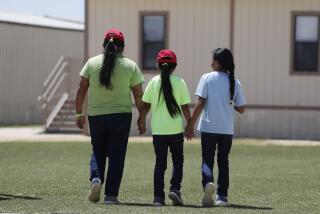INS Calling on Community Groups to Urge Aliens to Apply for Amnesty
- Share via
With less than four months remaining for many illegal aliens to seek amnesty, U.S. immigration authorities Friday called on community groups to urge prospective applicants to file their paper work as soon as possible.
Harold Ezell, western regional commissioner for the U.S. Immigration and Naturalization Service, said that the community organizations--many of which have long been critical of the INS--should concentrate their efforts on convincing people to apply.
Ezell was not directly critical of the groups, but it was clear that he was putting the onus on such organizations to motivate people to apply for amnesty.
“I’m asking the (community) leadership to stand up, to stand with us,” Ezell said at a San Diego news conference. “We feel that the INS has been as aggressive as it can be in getting the word out.”
Afterward, representatives of several San Diego County community groups contacted by The Times disputed what they viewed as an implied criticism in Ezell’s comments, contending that their organizations have always urged people to file for amnesty.
Program’s Management Assailed
The leaders also assailed the INS’ management of the amnesty program and accused Ezell of setting up the groups as potential scapegoats should the amnesty initiative fall short of expectations--as many have said it will.
Herman Baca, chairman of the Committee on Chicano Rights, based in National City, was blunt in assessing the INS official’s comments.
“I think Ezell’s remarks show that the whole program has been a disastrous failure,” Baca said.
Jess D. Haro, chairman of the Chicano Federation, a Latino advocacy group that has assisted amnesty applicants, said that “to imply in any way that community groups have not supported the amnesty program is wrong.
“I think what he (Ezell) is trying to do is deflect any future criticism,” Haro said.
Groups Tried to Cooperate
Moreover, Haro said community groups generally supported efforts to allow prospective amnesty applicants to apply for legal status beyond May 4, the current deadline for most applicants. The INS opposes any extention.
Carol Rogoff Hallstrom, who heads a coalition of legal and community organizations working on amnesty, said that all of the groups had attempted to cooperate with the INS, despite many differences of opinion.
In his comments at the press conference, Ezell maintained that the program had been a success.
Based on current projections, he noted, some 2 million people nationwide will probably apply for amnesty by May 4. In San Diego and Imperial counties, immigration officials said they were ahead of projections that some 50,000 people would ultimately apply.
However, critics have said that thousands--perhaps millions--of eligible foreigners are not applying for amnesty--either out of lack of knowledge, mistrust of the INS, fear of breaking up their families or other reasons.
Outreach Effort Singled Out
Detractors have singled out for criticism the INS’ $10 million outreach effort designed to inform prospective applicants.
Many said the program has fallen short, noting, for instance, that the INS hasn’t advertised extensively in the Spanish-language media favored by many immigrants.
“Most of the outreach has been by word of mouth and by the community organizations--not by the INS,” Haro said.
Under the 1986 immigration law, undocumented immigrants who have been living in the United States since at least Jan. 1, 1982, may qualify for legal status, or amnesty; they have until May 4 to apply.
In addition, those who have performed at least 90 days of farm work in the United States during a recent one-year period may also qualify for legal status; agricultural workers have until next Nov. 30 to apply.
More to Read
Sign up for Essential California
The most important California stories and recommendations in your inbox every morning.
You may occasionally receive promotional content from the Los Angeles Times.










